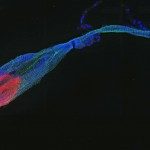Lien vers Pubmed [PMID] – 7770491
Philos. Trans. R. Soc. Lond., B, Biol. Sci. 1995 Apr;348(1323):89-95
Monoclonal antibodies that detect folding intermediates in vitro were used to monitor the appearance of folded polypeptide chains during their synthesis on the ribosomes. Nascent immunoreactive chains of the bacteriophage P22 tail-spike protein and of the Escherichia coli beta 2 subunit of tryptophan-synthase were thus identified, suggesting that they can fold on the ribosomes. Moreover, the immunoreactivity of ribosome-bound tryptophan-synthase beta-chains of intermediate lengths was shown to appear with no detectable delay compared to their synthesis. This suggested that beta-chains start folding during their elongation on the ribosomes. However, newly synthesized incomplete beta-chains were shown to interact with chaperones while still bound to the ribosome. Because of the peculiar properties of the epitope recognized by the anti-tryptophan-synthase monoclonal antibody used, it could not be concluded whether the immunoreactivity of the nascent beta-chains resulted from their ability to fold cotranslationally or from their association with chaperones which might maintain them in an unfolded, immunoreactive state.
